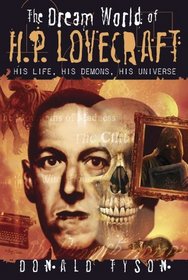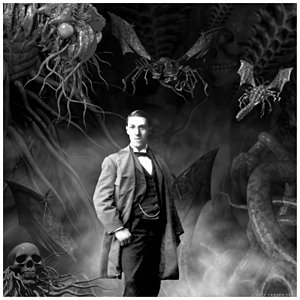 H.P. Lovecraft is one of the most influential writers on contemporary horror. As such, he has been the focus of a number of biographies, including H. P. Lovecraft: A Life by S. T. Joshi (Necronomicon press, 1996), and the documentary Lovecraft: Fear of the Unknown, directed by Frank Woodward. More recently, a new biography has been penned, The Dream World of H. P. Lovecraft: His Life, His Demons, His Universe (Llewellyn, 2010), by Donald Tyson. For some reason my local Barnes & Noble had a Lovecraft display up today and this book was a part of it, and I am thankful for it since I was previously unfamiliar with this volume.
H.P. Lovecraft is one of the most influential writers on contemporary horror. As such, he has been the focus of a number of biographies, including H. P. Lovecraft: A Life by S. T. Joshi (Necronomicon press, 1996), and the documentary Lovecraft: Fear of the Unknown, directed by Frank Woodward. More recently, a new biography has been penned, The Dream World of H. P. Lovecraft: His Life, His Demons, His Universe (Llewellyn, 2010), by Donald Tyson. For some reason my local Barnes & Noble had a Lovecraft display up today and this book was a part of it, and I am thankful for it since I was previously unfamiliar with this volume.
Llewelyn’s website describes the book as follows:
Author H. P. Lovecraft (1890–1937) was a man of contradictions. He had a disdain for magic and religion, but ended up creating a whole new mythology in the classic book called the Necronomicon. His stories are fiction, and yet have become much more than that. They strike a deep chord in readers because the concepts are archetypal and tap into human consciousness.
To truly understand his writing you have to learn about Lovecraft himself. Here, occultist, author, and Lovecraft expert Donald Tyson looks fully at the man himself and how his psyche influenced his writing. Tyson reveals his flaws, including racism, anti-Semitism, and admiration of Hitler. He shares how Lovecraft’s dreams terrified him, and that it was through his horrific tales that he was, to a degree, able to come to terms with his night terrors, fears, madness, and idiosyncrasies.
Lovecraft is dead, but Cthulhu lives. This is the first biography that reveals the sources and prepares you for what may come.
But this brief description does not do justice to the unique and controversial approach that Tyson takes in this biography. For this the back cover of the volume must be considered:
Occult scholar Donald Tyson plumbs the depths of H. P. Lovecraft’s cosmic visions and horrific dream world to examine, warts and all, the strange life of the man who created the Necronomicon and the Cthulu mythos.
Lovecraft expressed disdain for magic and religion, and most of his biographers have dismissed the mystical side of his nature. This book redresses this imbalance. Here you will find the roots of Lovecraft’s extraordinary cosmic vision laid bare. The dream-world sources for his mythic Old Ones are examined, along with the practical esoteric implications of Lovecraft’s unique mythology.
A man in fundamental conflict with himself, Lovecraft lived always on the brink of madness or suicide. Tyson reveals Lovecraft for what he truly was — a dreamer, an astral traveler, and the prophet of a New Age.
Tyson’s controversial thesis is revealed above as most biographers and fans who have looked into Lovecraft’s life consider him an atheist. Tyson recognizes this element of the complex horror writer, but argues that his dream experiences, which had a strong influence on his writing, were mystical and esoteric in nature, and thus there is the possibility that he may be understood as having an esoteric spiritual dimension.
 Although the book includes an endorsement statement on the back of the book by S. T. Joshi, a Lovecraft expert and atheist, stating that The Dream World of H. P. Lovecraft is a “fusion of sound biographical knowledge and critical insight,” nevertheless, the esoteric aspect of Tyson’s thesis has not been well received by other skeptics. For example, Jason Calavito summarizes his review of the book by saying:
Although the book includes an endorsement statement on the back of the book by S. T. Joshi, a Lovecraft expert and atheist, stating that The Dream World of H. P. Lovecraft is a “fusion of sound biographical knowledge and critical insight,” nevertheless, the esoteric aspect of Tyson’s thesis has not been well received by other skeptics. For example, Jason Calavito summarizes his review of the book by saying:
Tyson’s biography is occasionally fascinating, filled with interesting insights into Lovecraft’s dreams and their impact on his fiction; but his belief in the power and prevalence of the supernatural undercuts what might have been a truly unique exploration of Lovecraft’s dream world.
Beyond the disagreements skeptics and esotericists will have with Tyson’s treatment of Lovecraft, another interesting facet is Tyson’s discussion of the spiritual or religious dimensions of the Cthulu mythology wherein individuals have taken Lovecraft’s writings and used them as the basis for creation a new religion. This is the fascinating intersection of religion and popular culture known alternatively as hyper-real or fiction-based spiritualities. In the modern period more traditional religious expressions have given way to new forms of pursuing the sacred, and Lovecraft’s Cthulu mythos is part of the mix. Regardless of the disagreements between biographers over how to understand Lovecraft’s own views on religion, Tyson’s mining of his fiction and dream-world can be considered as a fascinating source of the spiritual.
I encourage those fans of Lovecraft who want to probe the life and continuing influence of this writer more deeply to pick up this volume. Llewellyn’s website provides an opportunity to browse inside the volume, and Tyson has an article on the site on Lovecraft that provides some insight into what he develops further in the book. For those interested in securing a copy of The Dream World of H. P. Lovecraft, simply click the link to order it through the TheFantastique Store.
Related posts:
“Lovecraft: Fear of the Unknown Documentary – Director Frank Woodward Interview”
“Irish Journal of Gothic and Horror Studies: Lovecraft and Occultism”
“Adam Possamai: Jediism, Matrixism, and ‘Hyper-Real’ Spiritualities”
“The Otherkin: Fantastic Texts, Pop Culture, and Neo-Religiosity”





Ah, this is exciting. I’m glad someone is looking into this inherent contradiction in Lovecraft. Joshi is helpful in delineating Lovecraft’s atheism, but the incipient spirituality can’t be ignored either. I’m hoping to write about this in the future also. Interesting that HPL is hugely influenced by a mystical Celtic Catholic (Machen).
Your blog and its subject matter are great by the way! Thanks for doing what you do.
Danial, thanks for stopping by and leaving a comment. Glad to find another person melding monstrous studies with theology.